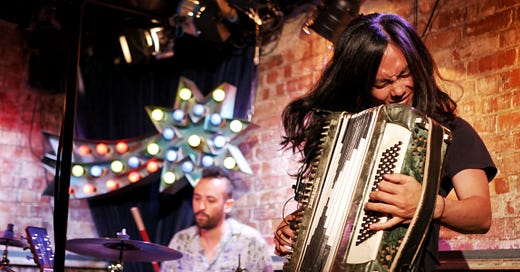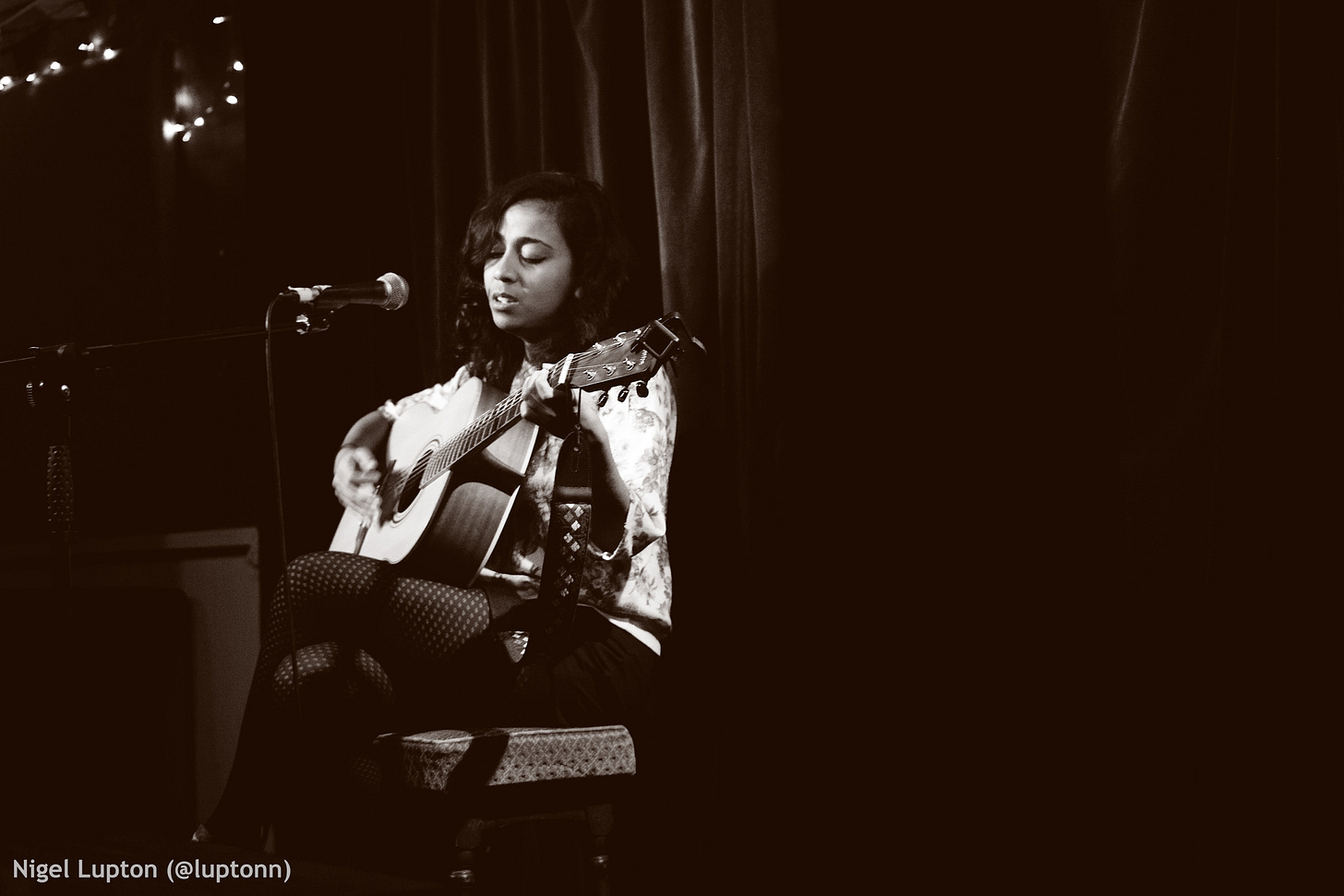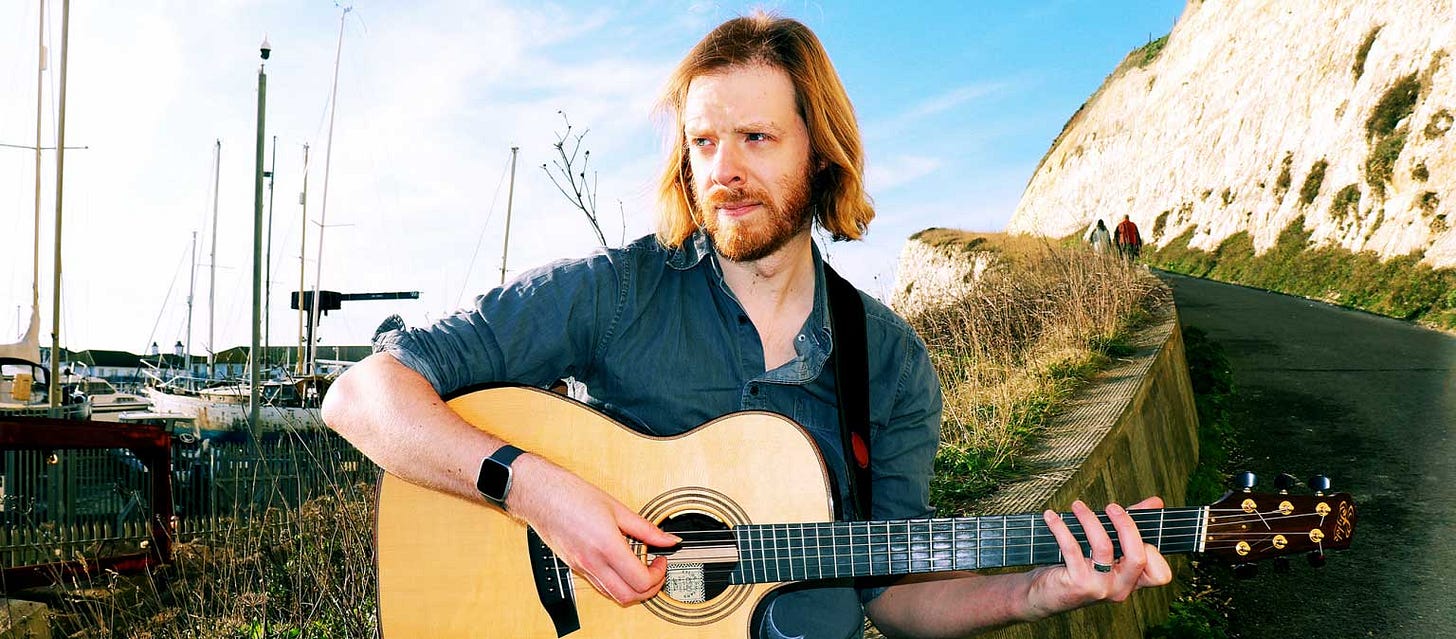Hello, and thank you for joining me for Modern Folk, the new monthly newsletter from Folkroom. Maybe you are an old friend, transplanted over from the now defunct Tinyletter. Maybe you are new to Folkroom. In either case, this feels like a good time to (re)introduce what we are, and what we’re doing.
My name is Stephen Rötzsch Thomas. Don’t worry about pronouncing the middle bit. I can’t do it convincingly myself, and I certainly won’t be testing you later. For just shy of fourteen years now, I’ve been running gigs - and occasionally releasing music by my favourite musicians - under the name of Folkroom.
Folkroom started impossibly small, in a tiny old Victorian pub deep in the heart of Kings Cross, London. In the beginning, it was just me, whichever three acts I’d booked for the night, and the most rudimentary of sound systems. Often there wasn’t even a real audience to speak of.
But before long, Folkroom had found a footing in the live music scene of London. We had regular fans, a burgeoning community of musicians who were passionate about supporting each other, and a growing group of artists and folk fans who had become a part of the Folkroom team. We outgrew our original venue, and moved around the corner to a bigger spot, which was frequently filled with attentive audiences. In 2017, I moved away from London, but the community around our events meant that they were able to continue even when I couldn’t be there. A few months after moving I was able to launch a new regular Folkroom night in the city I had transplanted to, Brighton.
I started Folkroom for two reasons, both of which were essentially selfish. Firstly, I wanted to be involved in the music that I love, even though I have no musical ability of my own whatsoever. And secondly, I wanted to make friends with interesting people in a city that was new and overwhelming to me at the time. But I was also able to put my all into those early years of Folkroom because, frankly, my all didn’t have a whole lot more to focus on. And, to completely miss the point made by one of the genre’s greatest living songwriters: the times, they are a-changin’.
Folkroom launched when I was 22 and unemployed. Now I’m 36, juggling a full-time job with freelance work, all while keeping an eye on the deadline for my first book. I’ve moved once again - this time to Nottingham - and am trying to build a home, and relationships, in this new city. I have two chronic illnesses, and really should get around to using my gym membership. Simply put: I’m not in the same place I once was.
By the time the pandemic hit in 2020, Folkroom was already over-subscribed. Myself, and the friends who support my often too zealous approach to the project, were running almost seventy gigs a year. And god knows we weren’t making any money - everything always went back to the artists. Folkroom was the size of a full-time job, but none of us could meet that commitment.
The pandemic itself wiped us out for almost 18 months. When we came back, the entire live music scene had changed. Audiences weren’t going out to gigs as much as they used to, and when they were, they were leaving the decision until the last minute - a disaster for a small enterprise like ours that needed to gauge audience sizes in advance or risk losing hundreds of pounds of our own money. Grassroots venues were decimated, and we found ourselves unable to continue at the London venue we’d called home for almost a decade.
Last year, I took some time off while attempting to buy a house - there’s only so much stress the human body can take at one time. As the process stretched out, I found myself unable to spare the time to revive Folkroom.
But obviously, I’m not done yet. It’d be a strange decision to launch a newsletter simply to say that I’ve given up, and am off to have a nice long nap.
I have this thing - Folkroom - that has already been built, and has already achieved so much. We’ve been featured in national newspapers, and won a BBC Folk Award for one of our releases. We’ve helped support developing artists, and celebrated established talent. Martin Carthy once stayed at my house after a gig, and complimented my father’s loganberry jam. You don’t give up on something like that.
I can’t believe the talent I’m surrounded with. Ben Walker, one of the most talented guitarists on the planet, played an early Folkroom gig with one speaker and no sound engineer, and inexplicably decided to stick around and help me out. Katie Carroll, despite having a ridiculous and immensely successful career of her own, gives so much of her time and talent to support our work, and my dear friend Michelle, who honestly doesn’t even like folk that much, has offered so much organisational guidance, solely because she believes in the community we have built together. And above all else, I’m spoiled by the musicians and artists that have been the heart of our events for the last decade and a half - many of whom keep coming back to Folkroom even as their careers flourish.
So now it’s time to relaunch Folkroom in a form that makes sense - not just for the gigs, but for me, and for the people who are still so dedicated to supporting this good thing that we have. And this relaunch is going to take two forms:
Fewer, better gigs.
We’ll be changing how we approach our gigs so that we can best deliver memorable nights that can meaningfully support the musicians. In Brighton, we’ll put on around four gigs a year, bringing established folk names to the city, and pairing them with new and upcoming support acts so you can continue to discover new music via Folkroom.
In London, where these established artists already have plenty of outlets, we’ll focus on giving opportunities to newer acts. We’ll host four or five great gigs each year, showcasing new talent and capturing that sense of reliable artist discovery that Folkroom fans have always expected from our gigs.
And I’m thrilled to finally be bringing Folkroom to my new hometown of Nottingham, where I’ll personally be hosting a monthly residency at the much-loved Peggy’s Skylight. These gigs will represent the full spectrum of folk, from established trad legends to experimental new artists who are broadening the folk horizon. The first of these events will see Alasdair Roberts and Donald WG Lindsay take to the stage on September 15th. You can buy your tickets here. In October, we’ll have The Magic Lantern joining us for the night - tickets for that one are available here.Modern Folk!
At the same time, we’ll be making more of our newsletter. We might have fewer gigs to shout about, but there’s still so much to celebrate and explore in the world of folk! And so we’re launching Modern Folk, which will act both as a source of information about Folkroom gigs and, more broadly, as a sort of digital folk zine.
Each month, Modern Folk will feature essays, articles or interviews that explore the expansive world of, you guessed it, modern folk music. I’ll be behind much of what you read here, but I also hope to draw on the talents of the myriad writers and artists within the wider Folkroom community. We’ll look at pressing issues impacting the genre, and touch on the traditions that inform the music we love. We’ll explore the boundaries of the genre, and the ways it seeks to connect with life in Britain (and beyond) - today.
Modern Folk’s main zine will be free to subscribe to - it makes no sense to hide news of our gigs behind a paywall! But there will be extra content for anybody who does want to offer us a little extra financial support. Folkroom has always been about sharing new music with audiences, and we’ll have less opportunity to do that as we host fewer gigs than before. Paid members of Modern Folk will get regular emails directly into their inbox recommending new music that I’ve been listening to and loving. Founder members will get the biggest perk of all: a digital copy of any new release put out by Folkroom Records. Any money made through subscriptions will enable us to pay contributors to the newsletter, or offer better fees to musicians playing our gigs.
It’s be a strange few years for Folkroom, as we’ve come to terms with losing venues, and attempting to get our heads around the changing habits of our audiences. The year-long house move didn’t help, either! But we’re going to ease back in now, making sure we can do the best for audiences and artists alike. I’ll be excited to hear your thoughts on our plans, and will hope to see you at a gig in the near future. Until then, there’ll be plenty more to come here at Modern Folk!








